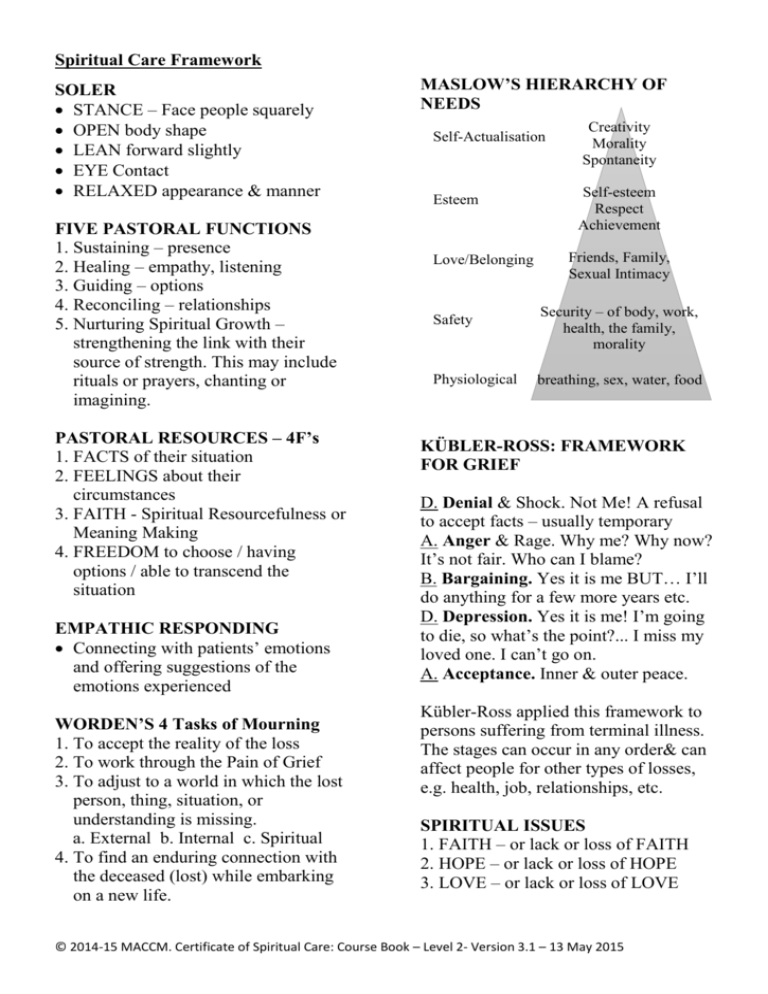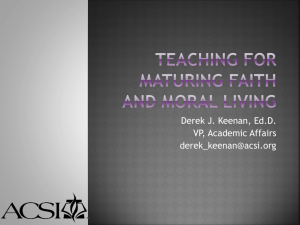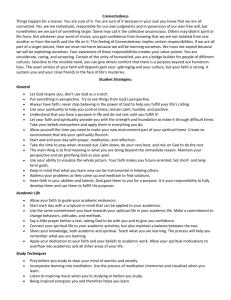Wyn's laminate 1 revised2015
advertisement

Spiritual Care Framework SOLER STANCE – Face people squarely OPEN body shape LEAN forward slightly EYE Contact RELAXED appearance & manner FIVE PASTORAL FUNCTIONS 1. Sustaining – presence 2. Healing – empathy, listening 3. Guiding – options 4. Reconciling – relationships 5. Nurturing Spiritual Growth – strengthening the link with their source of strength. This may include rituals or prayers, chanting or imagining. PASTORAL RESOURCES – 4F’s 1. FACTS of their situation 2. FEELINGS about their circumstances 3. FAITH - Spiritual Resourcefulness or Meaning Making 4. FREEDOM to choose / having options / able to transcend the situation EMPATHIC RESPONDING Connecting with patients’ emotions and offering suggestions of the emotions experienced WORDEN’S 4 Tasks of Mourning 1. To accept the reality of the loss 2. To work through the Pain of Grief 3. To adjust to a world in which the lost person, thing, situation, or understanding is missing. a. External b. Internal c. Spiritual 4. To find an enduring connection with the deceased (lost) while embarking on a new life. MASLOW’S HIERARCHY OF NEEDS Self-Actualisation Esteem Love/Belonging Creativity Morality Spontaneity Self-esteem Respect Achievement Friends, Family, Sexual Intimacy Safety Security – of body, work, health, the family, morality Physiological breathing, sex, water, food KÜBLER-ROSS: FRAMEWORK FOR GRIEF D. Denial & Shock. Not Me! A refusal to accept facts – usually temporary A. Anger & Rage. Why me? Why now? It’s not fair. Who can I blame? B. Bargaining. Yes it is me BUT… I’ll do anything for a few more years etc. D. Depression. Yes it is me! I’m going to die, so what’s the point?... I miss my loved one. I can’t go on. A. Acceptance. Inner & outer peace. Kübler-Ross applied this framework to persons suffering from terminal illness. The stages can occur in any order& can affect people for other types of losses, e.g. health, job, relationships, etc. SPIRITUAL ISSUES 1. FAITH – or lack or loss of FAITH 2. HOPE – or lack or loss of HOPE 3. LOVE – or lack or loss of LOVE © 2014-15 MACCM. Certificate of Spiritual Care: Course Book – Level 2- Version 3.1 – 13 May 2015 FREEDOM is how we choose to look at our circumstances and discern our options ERIKSON’S STAGES OF HUMAN DEVELOPMENT. Child Stages: 0-11 years. 1. Basic trust vs. basic mistrust. 2. Autonomy vs. Shame 3. Purpose-Initiative vs. Guilt 4. Competence-Industry vs. Inferiority Adolescent Stages: 12-20 5. Fidelity-Identity vs. Role Confusion Early Adulthood: usually 20-24 6. Intimacy vs. Isolation Later Adulthood: usually 25-64 7. Generativity vs. Stagnation Later Chapter of Life: usually 65+ 8. Ego Integrity vs. Despair FOWLER’S STAGES OF SPIRITUAL DEVELOPMENT 1. Intuitive-Projective: pre-school 2. Mythic-Literal: Faith Community or their Stories 3. Synthetic-Conventional: teenagers – authority placed in individuals or groups – many people remain her all their lives. 4. Individuative-Reflective: people critically examine their beliefs – angst & struggle – openness to other beliefs (20’s – 30’s). 5. Conjunctive Faith: midlife acceptance of the paradoxes of life. Life is a mystery. Transcendence is recognized. 6. Universalizing Faith: life in service to others, no worries or doubts. Enlightenment. Framework compilation originally conceived by Wyn Coghlan, and used by MACCM Inc with her approval. Edited July 2015. GENERIC PASTORAL GOALS 1. To get into the habit of using Empathic Responses. 2. To get into the habit of using the Pastoral Resources: Facts, Feelings, Faith & Freedom. 3. To assess where the patient is within Maslow’s Hierarchy of Needs. 4. To assess where the patient is within Kübler-Ross’s Loss and Grief Framework. 5. To assess what stage the patient is in Worden’s 4 Tasks of Mourning. 6. To assess what stage is the patient in Erikson’s Eight Stages of Human Development. 7. To assess where the patient is in Fowler’s Six Stages of Faith Development. 8. To assess the patient’s Spiritual Issues: Faith, Hope and Love 9. To explore what the patient’s beliefs and spiritual resources are. Level 3 & 4: 10. To become familiar with and use Carl Roger’s Gentle Confrontation where appropriate. 11. To become familiar with and use the skill of story listening where appropriate. 12. To assess what is the patient’s spiritual anthropology. SPIRITUAL ANTHROPOLOGIES 1. Humankind is damaged goods in need of restoration 2. Humankind is basically good, but frustrated from achieving selffulfilment by poor life choices or by external circumstances or the intervention of others. 3. Humankind, like every other living thing, is part of the eternal cycle of birth, death and the regeneration of the Universe. © 2014-15 MACCM. Certificate of Spiritual Care: Course Book – Level 2- Version 3.1 – 13 May 2015





